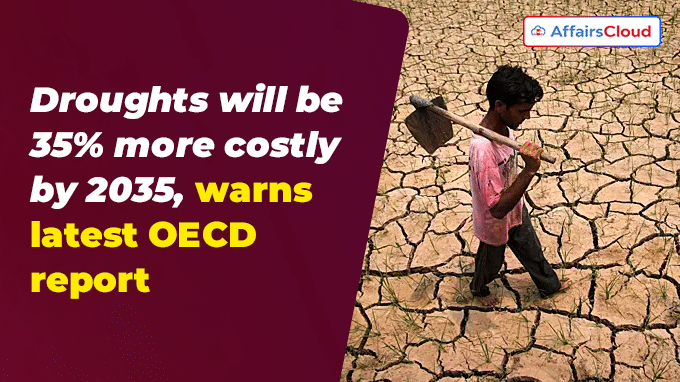 In June 2025, Paris (France) based Organisation for Economic Cooperation and Development (OECD) released its latest report titled ‘Global Drought Outlook: Trends, Impacts and Policies to Adapt to a Drier World’. This report warned that without effective adaptation measures, the economic costs of droughts are expected to increase by at least 35% worldwide by 2035, compared to current levels.
In June 2025, Paris (France) based Organisation for Economic Cooperation and Development (OECD) released its latest report titled ‘Global Drought Outlook: Trends, Impacts and Policies to Adapt to a Drier World’. This report warned that without effective adaptation measures, the economic costs of droughts are expected to increase by at least 35% worldwide by 2035, compared to current levels.
- The report highlighted that the global land area affected by drought has doubled between 1900 and 2020. Since 1980, 37% of the world’s land has experienced a significant decline in soil moisture.
- Droughts are periods defined by a substantial imbalance in water availability, usually caused by extended “drier-than-normal” weather conditions affecting water sources or reservoirs.
About OECD’s Global Drought Outlook Report:
i.The report was developed under the supervision of the OECD Environment Policy Committee (EPOC) and benefitted from discussions held in the Working Parties on Climate Change (WPCC) and on Biodiversity, Water and Ecosystems (WPBWE).
ii.The report provides a global assessment of droughts risks, impacts and policy responses considering climate change.
iii.It also provides practical policy solutions to minimize losses, build long-term resilience, and support adaptation to a drier future.
Key Findings:
i.Currently, 40% of the planet is experiencing more frequent and severe dry spells, emphasizing the urgent need for coordinated government action to reduce the associated losses.
- It is mainly driven by change of global climate patterns like: rising temperatures intensify evaporation, reduce soil moisture and compromise the natural replenishment of aquifers.
ii.The report also underscored that under a +4 degree Celsius(°C) global warming scenario, droughts are expected to be maximum 7 times more frequent and intense than in the absence of climate change.
iii.The report pointed out that droughts do not differentiate between developed countries and developing regions. It underlined that while poorer countries suffer more severely from social consequences such as hunger, forced migration or decreasing livelihoods.
- For instance: In 2021, drought had caused over USD 1.1 billion in damage to the agricultural sector alone in the United States of America (USA).
iv.As per the report, 62% of monitored aquifers across the world show a sustained decline in their levels. This condition is driven by soil degradation, loss of plant productivity and deterioration of important ecosystem services like: climate regulation and water filtration.
- The report projected that, if current trends continue, aquifer depletion rates could double by 2100.
v.The report highlighted that globally, the costs of water scarcity have increased by 3 to 7.5% annually in recent years.
Other Key Points:
i.Economic losses caused by droughts have been rising steadily at a rate of over 3% each year. This ongoing increase highlights the growing financial impact of droughts globally.
ii.The report revealed that Agriculture is the most affected sector: in particularly dry years, crop yields can decline by maximum 22%.
- It has projected that doubling of drought duration could reduce the production of key crops like: soy and corn by up to 10%.
iii.The report highlighted that severe droughts can decrease fluvial trade volumes by up to 40% and reduce hydroelectricity production by over 25%, affecting supply chains and energy availability.
iv.The reports highlighted that though droughts account for only 6% of natural disasters, they can cause 34% of all disaster-related deaths and exacerbate displacement and migration, especially in Sub-Saharan Africa.
v.The report suggested certain measures like: sustainable land-use, ecosystem restoration, and adaptive agricultural practices can help retain water in the soil, regulate hydrological cycles, and improve resilience.
About the Organisation for Economic Cooperation and Development (OECD):
Secretary General- Mathias Hubert Paul Cormann
Headquarters- Paris, France
Established- 1961




